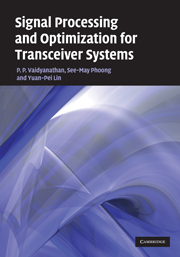Book contents
- Frontmatter
- Contents
- Preface
- Acknowledgements
- Part 1 Communication fundamentals
- Part 2 Transceiver optimization
- 9 History and outline
- 10 Single-input single-output transceiver optimization
- 11 Optimal transceivers for diagonal channels
- 12 MMSE transceivers with zero-forcing equalizers
- 13 MMSE transceivers without zero forcing
- 14 Bit allocation and power minimization
- 15 Transceivers with orthonormal precoders
- 16 Minimization of error probability in transceivers
- 17 Optimization of cyclic-prefix transceivers
- 18 Optimization of zero-padded systems
- 19 Transceivers with decision feedback equalizers
- Part 3 Mathematical background
- Part 4 Appendices
- Glossary
- Acronyms
- References
- Index
19 - Transceivers with decision feedback equalizers
from Part 2 - Transceiver optimization
Published online by Cambridge University Press: 05 August 2011
- Frontmatter
- Contents
- Preface
- Acknowledgements
- Part 1 Communication fundamentals
- Part 2 Transceiver optimization
- 9 History and outline
- 10 Single-input single-output transceiver optimization
- 11 Optimal transceivers for diagonal channels
- 12 MMSE transceivers with zero-forcing equalizers
- 13 MMSE transceivers without zero forcing
- 14 Bit allocation and power minimization
- 15 Transceivers with orthonormal precoders
- 16 Minimization of error probability in transceivers
- 17 Optimization of cyclic-prefix transceivers
- 18 Optimization of zero-padded systems
- 19 Transceivers with decision feedback equalizers
- Part 3 Mathematical background
- Part 4 Appendices
- Glossary
- Acronyms
- References
- Index
Summary
Introduction
In Sec. 5.7 we described decision feedback equalizers (DFEs). These equalizers use past decisions on symbols to refine the decision on the present symbol. In this chapter we extend this idea to decision feedback equalization in memoryless MIMO channels. Here past decisions within a block are used to improve future decisions in that block, at a given block-time instant. The basic idea is introduced in Sec. 19.2. The decision feedback transceiver has a precoder F, feedforward equalizer G, and a feedback matrix B. In Sec. 19.3 we show how these matrices can be jointly optimized to minimize the mean square reconstruction error, under the zero-forcing constraint. We will see that in DFE systems the minimized mean square error depends on the geometric mean of 1/σh,k rather than on their arithmetic mean (where σh,k are the channel singular values). This transition from AM to GM is a fundamental property of DFE systems, and results in substantial decrease of the mean square error. In Sec. 19.4 we extend the joint optimization to the case where there is no zero forcing. DFE systems with minimum symbol error rate are presented in Sec. 19.5. Error probability plots are presented in Sec. 19.6, showing the superiority of DFE transceivers over linear transceivers. It turns out that optimal DFE systems are related to systems optimizing mutual information; this is elaborated in Sec. 19.7. A brief description of DFE receivers based on QR decomposition, and the VBLAST receiver are given in Sec. 19.8.
Information
- Type
- Chapter
- Information
- Signal Processing and Optimization for Transceiver Systems , pp. 592 - 659Publisher: Cambridge University PressPrint publication year: 2010
